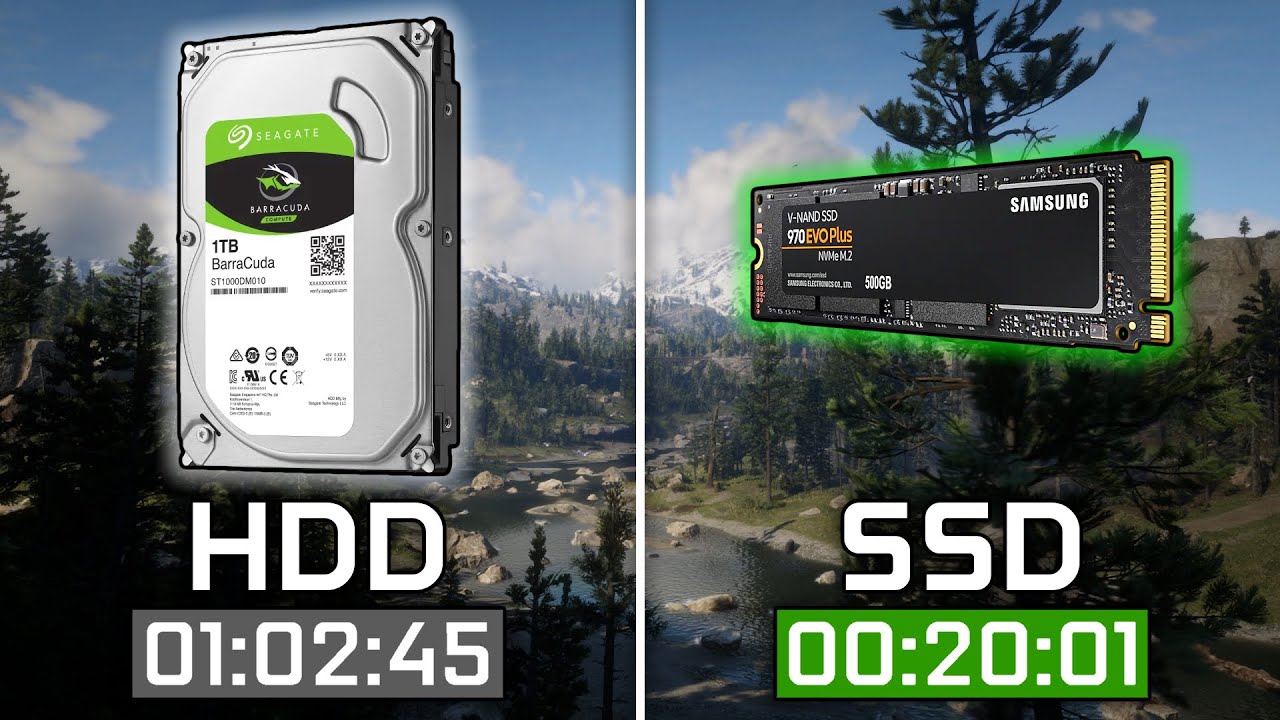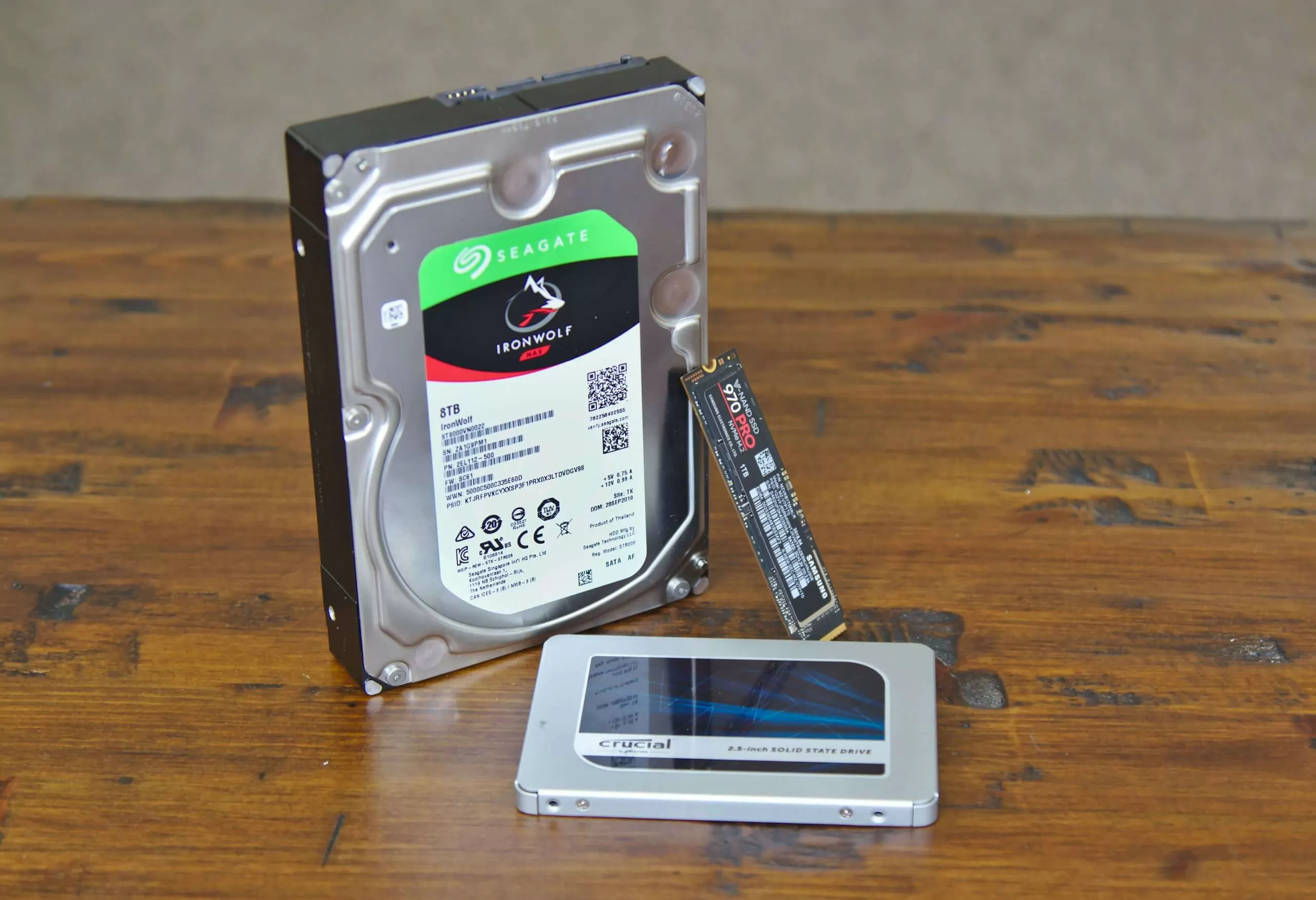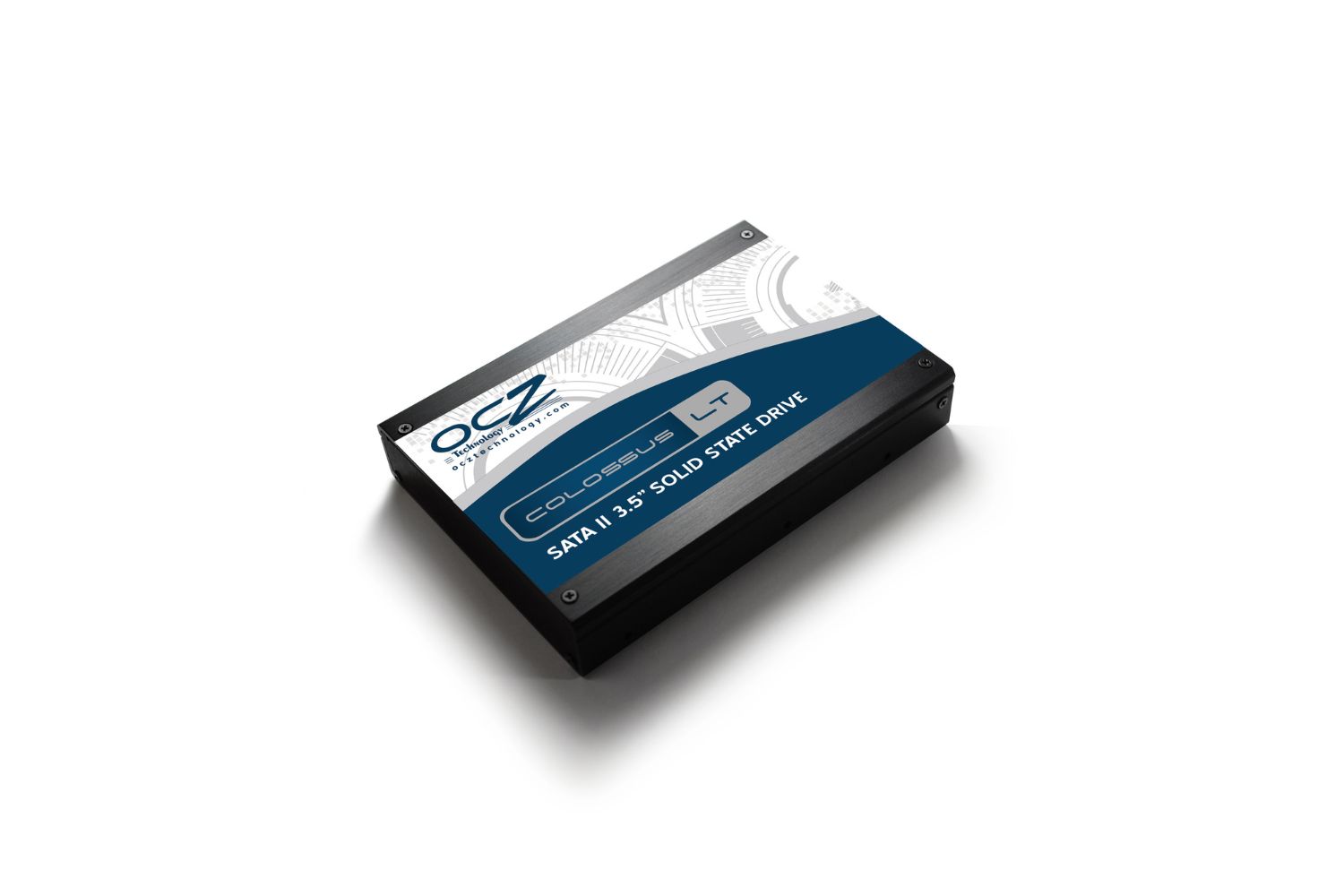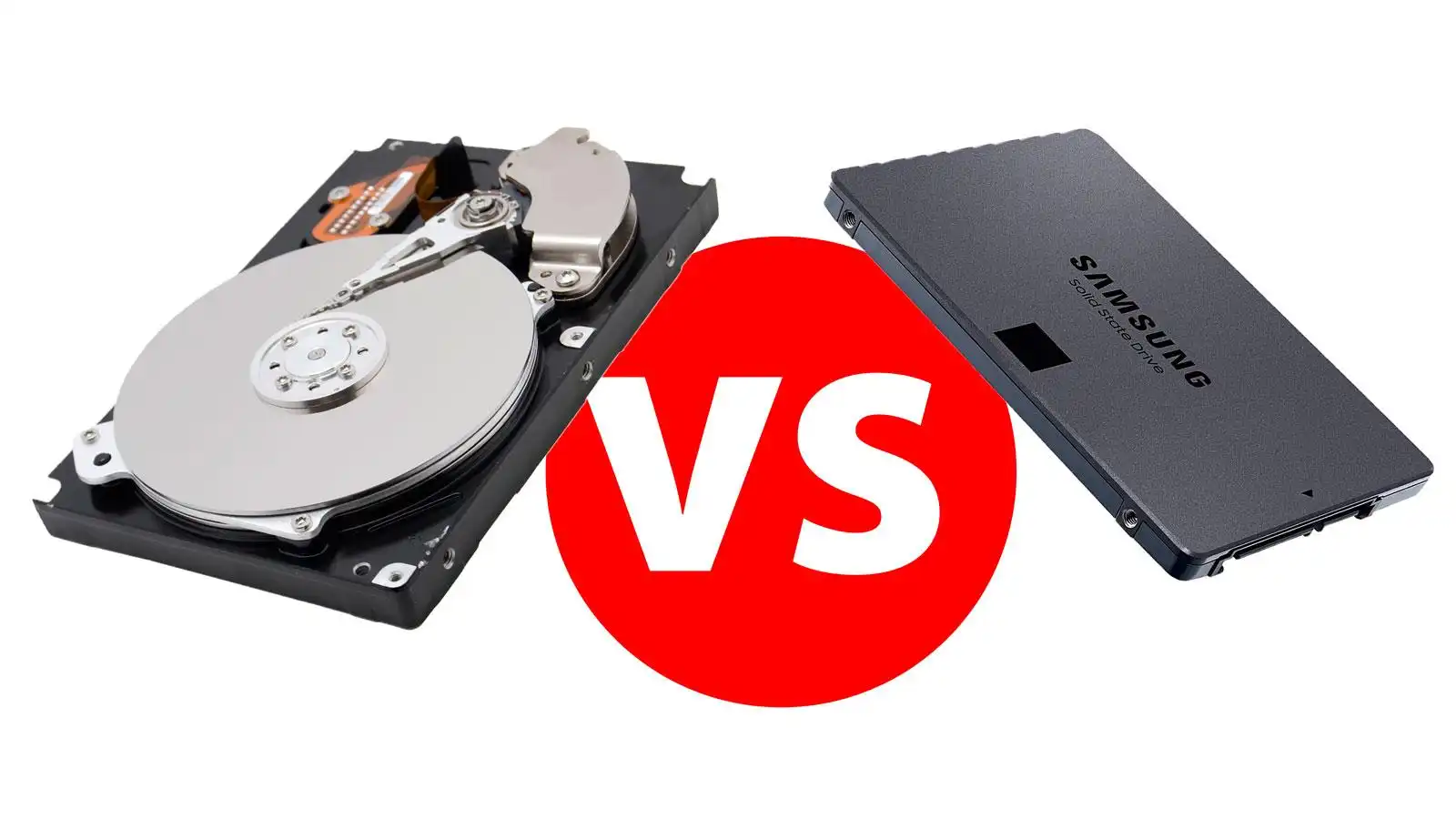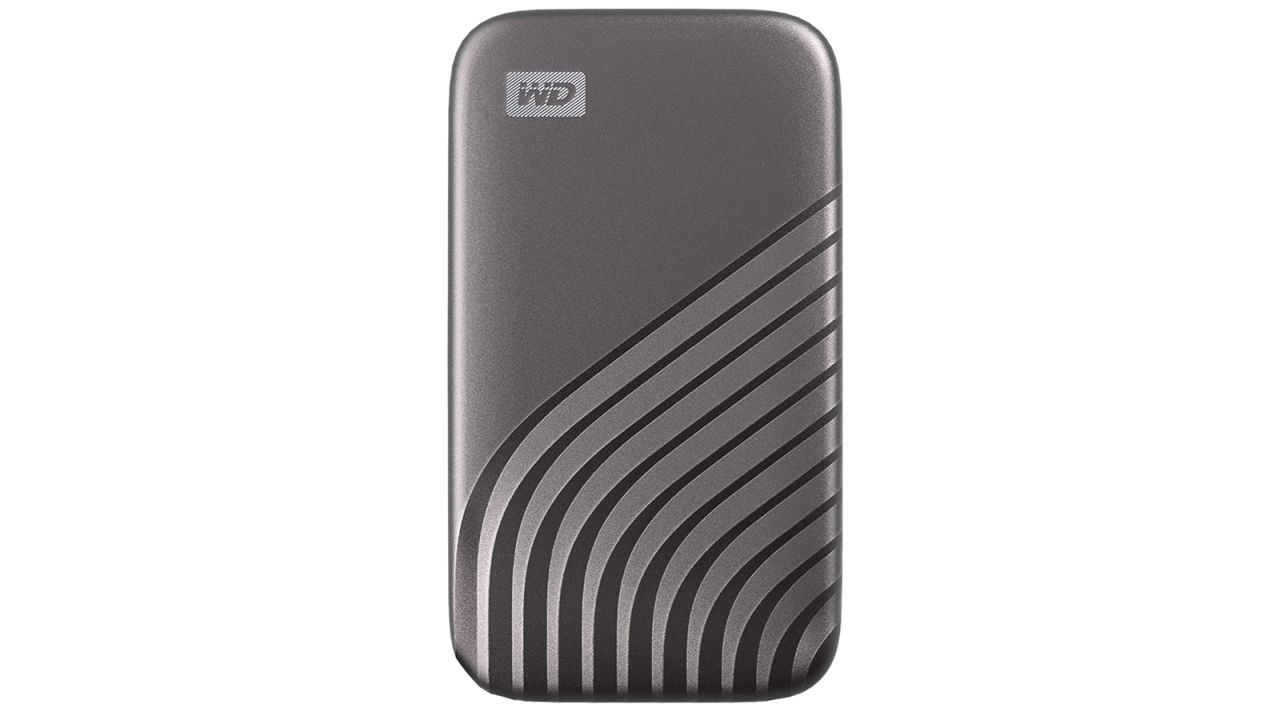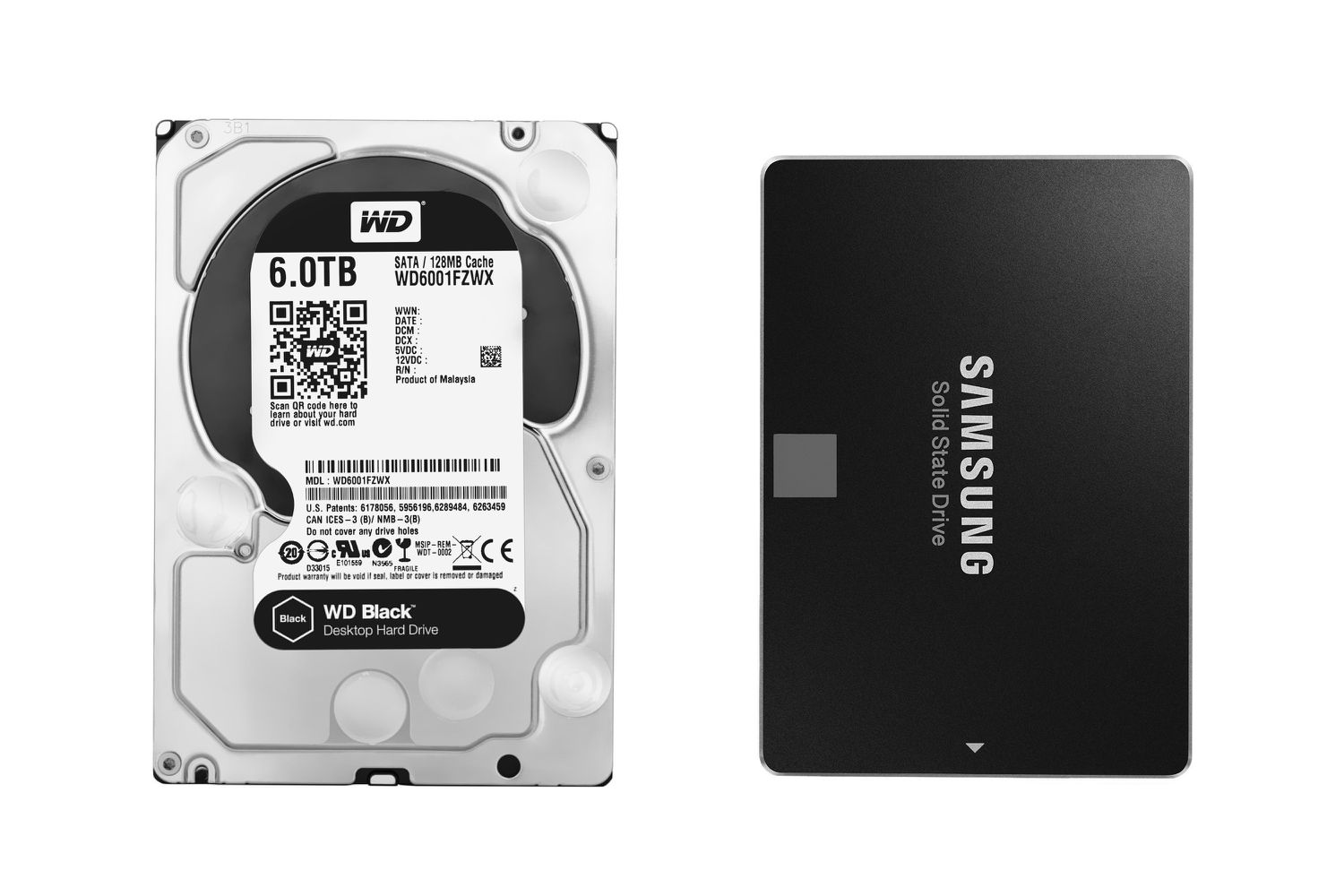Introduction
When it comes to gaming, one of the crucial factors that can significantly impact your gaming experience is the choice between a Solid State Drive (SSD) and a Hard Disk Drive (HDD). These two types of storage devices have their own advantages and drawbacks, making the decision of selecting the most suitable one a challenging task for gamers.
SSDs and HDDs serve the same purpose of storing and retrieving data, but they differ in terms of technology, performance, and price. While HDDs have been the traditional choice for gaming, SSDs have gained popularity in recent years due to their faster speeds and improved reliability. So, which one should you opt for when it comes to gaming? In this article, we’ll delve into the key differences between SSDs and HDDs and analyze their impact on gaming performance.
An SSD, as the name suggests, uses solid-state memory to store data. It consists of flash memory chips that retain data even when power is not supplied. On the other hand, an HDD utilizes mechanical moving parts, including a spinning disk and a mechanical arm, to read and write data.
The primary advantage of SSDs lies in their speed and performance. Due to the absence of moving parts, data can be accessed and transferred at much faster speeds compared to HDDs. This results in reduced loading times for games, faster installations, and quicker boot-up times. The improved speed of SSDs can have a significant impact on gaming, providing a smoother and more seamless experience.
However, HDDs still hold an advantage in terms of storage capacity and cost per gigabyte. They offer larger storage capacities at a lower cost compared to SSDs. So, if you have a vast game library or require ample space for other data, an HDD might be a more suitable choice.
In this article, we will compare SSDs and HDDs across various factors, including speed, load times, installation time, reliability, durability, storage capacity, and cost. By considering these factors, you’ll be able to make an informed decision on whether an SSD or HDD is the better option for your gaming needs.
What is an SSD?
An SSD, or Solid State Drive, is a type of storage device that uses solid-state memory to store and retrieve data. Unlike traditional Hard Disk Drives (HDDs), SSDs do not have any moving parts, which results in faster access and transfer speeds.
SSDs are built using flash memory technology, which consists of non-volatile memory cells that retain data even when there is no power supply. These memory cells are organized into blocks, with each block containing multiple pages. The data is stored in these pages using electrical charges, which can be read or written by the SSD’s controller.
One of the key advantages of SSDs is their speed and performance. Without the need for mechanical parts, SSDs can access and transfer data at a much faster rate compared to HDDs. This results in reduced loading times for games and applications, allowing for a more responsive and immersive gaming experience.
SSDs also excel in random access speeds, meaning they can access and retrieve data from any location on the drive quickly. This is particularly beneficial for gaming, as it allows for faster asset loading and improved overall game performance.
Another benefit of SSDs is their durability and resistance to physical damage. Since they lack moving parts, they are less susceptible to mechanical failure and are more resistant to shocks and vibrations. This makes them a reliable choice for gamers who may need to transport their gaming equipment frequently.
SSDs are available in different form factors, including 2.5-inch drives, M.2 SSDs, and PCIe SSDs. The 2.5-inch SSDs are the most common and can easily replace traditional HDDs in laptops and desktop computers. M.2 SSDs, on the other hand, are smaller in size and connect directly to the motherboard, offering even faster speeds. PCIe SSDs are the fastest option and are typically found in high-end gaming systems.
However, one drawback of SSDs is their relatively higher cost per gigabyte compared to HDDs. This means that SSDs tend to offer less storage capacity for the same price as an HDD. However, the price of SSDs has been gradually decreasing over time, making them more affordable and accessible for gamers.
In summary, an SSD is a storage device that uses solid-state memory to store and retrieve data. Its key advantages include faster speeds, improved random access times, durability, and resistance to physical damage. While they may have a higher cost per gigabyte compared to HDDs, the benefits they offer in terms of speed, performance, and reliability make them an excellent choice for gamers.
What is an HDD?
An HDD, or Hard Disk Drive, is a type of storage device that has been the standard choice for storing data for many years. It consists of one or more spinning disks, called platters, that are coated with a magnetic material. A mechanical arm, known as the actuator, moves back and forth across the platters to read and write data.
HDDs store data using magnetic patterns on the platters. These patterns represent the binary code of the data, which can be read or written by the magnetic heads attached to the actuator. The spinning motion of the platters allows the heads to access different areas of the disk, making it possible to retrieve specific information as needed.
One of the primary advantages of HDDs is their cost per gigabyte. HDDs offer significantly more storage capacity for the same price compared to SSDs. This makes them an ideal choice for gamers who need a large amount of space to store their game libraries, media files, and other data.
Another advantage of HDDs is their compatibility and widespread usage. They have been the standard storage option in computers for decades, and most gaming systems are equipped with HDDs by default. This makes it easy to find and install HDDs in most gaming setups without requiring any additional hardware or software modifications.
However, one of the drawbacks of HDDs is their slower speeds compared to SSDs. Since HDDs rely on mechanical components, they are slower in accessing and transferring data. This can result in longer loading times for games and applications, which may impact the overall gaming experience, especially for modern, demanding games.
Additionally, HDDs are more prone to mechanical failure and damage due to their moving parts. The spinning platters and mechanical arm make HDDs sensitive to physical shocks and vibrations, increasing the risk of data loss or drive failure. This is why it is essential to handle HDDs with care, especially when transporting or moving gaming systems.
HDDs are available in various sizes and form factors, including 2.5-inch and 3.5-inch drives. The 2.5-inch drives are commonly used in laptops, while the larger 3.5-inch drives are typically found in desktop computers and external storage devices.
In summary, an HDD is a storage device that uses spinning disks and mechanical components to store and retrieve data. Its key advantages include cost-effectiveness and wide compatibility. However, HDDs are slower than SSDs, and their mechanical nature makes them more susceptible to failure and damage. Nevertheless, HDDs continue to be a popular choice for gamers who require large storage capacities at an affordable price.
Speed and Performance
One of the critical factors to consider when choosing between an SSD and an HDD for gaming is their speed and overall performance. SSDs have a significant advantage in this area due to their solid-state nature, which eliminates the need for mechanical parts.
SSDs can access and transfer data at much faster speeds compared to HDDs. This results in reduced loading times for games, faster installations, and quicker boot-up times. With an SSD, you can expect games to load much more quickly, allowing you to jump into the action without unnecessary delays. Additionally, a faster boot-up time means you can start gaming almost immediately after turning on your system.
HDDs, on the other hand, are slower in terms of accessing and retrieving data due to their mechanical nature. The spinning platters and moving arm take more time to read and write data, which can lead to longer loading times for games and applications. While this may not be a significant issue for less demanding or older games, it can become noticeable when playing newer, graphically intense titles that require faster data access.
Another aspect of speed and performance is random access times. SSDs excel in this area, allowing for near-instantaneous access to any location on the drive. This is particularly important in gaming, as it allows for faster asset loading and smoother gameplay. With an SSD, you’ll experience minimal lag or stuttering in games, resulting in a more immersive and enjoyable gaming experience.
However, it’s worth noting that for sequential read and write operations, such as transferring large files, the speed difference between SSDs and HDDs may not be as noticeable. HDDs can still offer respectable transfer speeds for larger files, making them a viable option if you frequently work with large media files or require significant storage capacity.
In summary, when it comes to speed and performance, SSDs have a clear advantage over HDDs. Their solid-state technology allows for faster data access, reduced loading times, quicker installations, and improved random access speeds. This results in a smoother and more responsive gaming experience. While HDDs can still be sufficient for less demanding games or tasks that require large storage capacities, SSDs truly shine in terms of speed and performance for gaming.
Load Times
Load times in gaming can make a significant difference in the overall gaming experience. Whether it’s starting up a game, transitioning between levels or areas, or even loading in-game assets, faster load times can contribute to a smoother and more immersive gaming session.
When it comes to load times, SSDs have a clear advantage over HDDs. Due to their faster data access and transfer speeds, SSDs can significantly reduce the time it takes for games to load. This means that you spend less time waiting for loading screens and can get into the action much more quickly.
With an SSD installed, games load faster because the drive can retrieve and deliver the necessary data to the system’s memory at a much higher speed. This is especially noticeable in open-world games or games with large environments, where there is a lot of data to load. In such cases, you’ll experience shorter loading screens and smoother transitions between game areas.
On the other hand, HDDs are slower in data retrieval, which can result in longer load times. Games stored on an HDD may take more time to load, and you may have to sit through longer loading screens before you can start playing. While this may not be a significant issue for everyone, it can be frustrating for gamers who value efficiency and want to get into the gameplay as quickly as possible.
Additionally, SSDs also offer an advantage when it comes to loading in-game assets. Games often require loading new textures, models, and other assets as you progress. With an SSD, these assets can load faster, resulting in smoother gameplay and fewer instances of objects or textures popping in late. This contributes to a more immersive and visually pleasing gaming experience.
It’s worth noting that load times can also be affected by other factors such as the game’s optimization, system specifications, and the game’s design. However, having an SSD can still provide a noticeable improvement in load times compared to an HDD, regardless of these additional factors.
In summary, SSDs offer a significant advantage in reducing load times compared to HDDs. The faster data access and transfer speeds of SSDs result in shorter loading screens, quicker transitions between game areas, and faster loading of in-game assets. This contributes to a more seamless and immersive gaming experience. While HDDs may still function adequately for gaming, those who prioritize shorter load times and smoother gameplay may prefer the superior performance of an SSD for faster load times.
Game Installation Time
Game installation time is an important consideration for gamers, especially when dealing with large game files or multiple game installations. The time it takes to install a game can vary depending on the storage device being used, with SSDs offering a significant advantage over HDDs.
SSDs, with their faster data transfer speeds, can greatly reduce the time it takes to install games. When installing a game on an SSD, the data can be read and written at a much higher rate, resulting in a quicker installation process. This means that you can start playing your favorite games sooner without having to wait for a lengthy installation process to complete.
With an SSD, the installation time for games is often noticeably shorter. The fast read and write speeds allow game data to be transferred from the installation media to the SSD at a rapid pace. This is particularly beneficial when installing large games with gigabytes of data, as the reduced installation time saves you from the frustration of waiting for extended periods of time.
On the other hand, HDDs are slower in data transfer, which can result in longer game installation times. Games installed on an HDD may take more time to copy all the necessary files, leading to a delay in playing the game. This can be particularly noticeable with large games or game updates that require a significant amount of data to be transferred.
It’s important to note that while SSDs offer faster installation times, the overall duration can still depend on several factors, including the game’s size, the installation method, system specifications, and the connection interface (such as SATA or NVMe). However, the advantage of SSDs in terms of installation time is still significant compared to HDDs.
In summary, SSDs excel in reducing game installation time due to their faster data transfer speeds. With an SSD, you can expect faster installation times, allowing you to start playing your games sooner. HDDs, on the other hand, are slower in data transfer, which can result in longer installation times. For gamers who value efficiency and want to minimize the time spent waiting for game installations to complete, an SSD is the preferred choice.
Boot Time
Boot time refers to the time it takes for your gaming system to start up and be ready for use. A faster boot time can save you valuable time and provide a more seamless gaming experience. When it comes to booting up your system, SSDs have a clear advantage over HDDs.
SSDs, with their faster data access and transfer speeds, can significantly reduce boot time. With an SSD as your primary storage device, your operating system and other essential system files can be loaded and accessed much more quickly, resulting in a faster startup process. Instead of waiting for your system to boot up, you can start gaming almost immediately.
SSDs offer near-instantaneous access to stored data, allowing the operating system to load and initialize faster. This means you spend less time looking at a boot screen and more time launching your favorite games. With faster boot times, you can get into the action without unnecessary delays, enhancing the overall gaming experience.
On the other hand, HDDs are slower in data access, which can result in longer boot times. With an HDD, the mechanical components require more time to read and load the necessary operating system files. This can lead to a slower startup process, causing frustration for gamers who wish to dive into gameplay quickly.
It’s worth noting that boot time can also be influenced by other factors such as system specifications, startup programs, and the overall system optimization. However, the inherent speed advantage of SSDs allows for faster boot times compared to HDDs, even in systems with similar configurations.
Another factor that can impact boot time is the usage of a solid-state drive as a boot drive and an HDD as a secondary storage drive. In this case, the operating system and essential files are stored on the faster SSD, while games and other data are stored on the HDD. This configuration can result in faster boot times, as the system can take advantage of the SSD’s speed for crucial startup processes.
In summary, SSDs offer a significant advantage in terms of boot time compared to HDDs. The faster data access and transfer speeds of SSDs allow for faster loading and initialization of the operating system. This means that you can start gaming sooner without having to wait for a lengthy boot process. While boot time can also be influenced by other factors, such as system specifications, SSDs provide a noticeable improvement in reducing boot time and enhancing the overall gaming experience.
Reliability and Durability
When it comes to storage devices for gaming, reliability and durability are important factors to consider. You want a storage device that can withstand continuous usage and protect your valuable gaming data. In terms of reliability and durability, both SSDs and HDDs have their own advantages and considerations.
SSDs are generally more reliable than HDDs due to their lack of moving parts. Since SSDs do not have spinning disks or mechanical arms, they are less susceptible to mechanical failures that can occur in HDDs. This means that SSDs are more resistant to shocks, impacts, and vibrations, making them a more durable choice for gamers who may need to transport or move their gaming systems frequently.
Furthermore, SSDs have a lower chance of developing bad sectors, which are areas on the storage device that cannot reliably hold data. HDDs, on the other hand, are prone to bad sectors as the mechanical components can wear down over time. Although modern HDDs come with built-in error correction mechanisms, the risk of data loss due to bad sectors is higher with HDDs compared to SSDs.
However, it’s important to note that the overall lifespan of an SSD can be affected by the number of read and write cycles it undergoes. Each memory cell in an SSD has a finite number of cycles before it starts to degrade. The lifespan of an SSD can vary depending on the drive’s technology and usage patterns. Modern SSDs, however, have improved significantly in terms of longevity, and with normal usage, they can last for many years without any performance degradation.
On the other hand, HDDs are generally considered to be reliable and have been used as the primary storage option for many years. Although they have moving parts, modern HDDs have built-in mechanisms, such as error correction and detection, to minimize the risks of data loss and drive failure. However, since they have mechanical components, they are more susceptible to mechanical failures, such as disk crashes or read/write head issues.
It’s worth considering that with HDDs, there is the possibility of data loss and drive failure if subjected to physical shock, vibration, or improper handling. It’s essential to handle HDDs with care, especially when moving or transporting your gaming system, to avoid potential damage that could compromise the integrity of your data.
In summary, while both SSDs and HDDs can be reliable and durable, SSDs have an advantage due to their lack of moving parts. They are more resistant to shocks, vibrations, and mechanical failures. However, the overall lifespan of an SSD can be influenced by usage patterns, while HDDs are more susceptible to mechanical failures. Regardless of the choice between SSDs and HDDs, it’s vital to handle storage devices with care and regularly backup important gaming data to ensure its safety and protect against any potential drive failures or data loss.
Size and Storage Capacity
When it comes to size and storage capacity, both SSDs and HDDs have their own advantages and trade-offs. Understanding the differences in size and storage capacity can help you choose the right storage device for your gaming needs.
In terms of physical size, SSDs have the advantage of being much smaller and more compact compared to HDDs. This makes them an excellent choice for gaming systems where space is limited, such as laptops or smaller form factor desktops. SSDs are available in various form factors, including 2.5-inch drives, M.2 SSDs, and PCIe SSDs, allowing you to choose the size that best fits your system’s requirements.
HDDs, on the other hand, are larger and require more physical space. They are commonly available in 3.5-inch and 2.5-inch sizes, with the former being more commonly used in desktop systems and the latter in laptops. If you have ample space in your gaming setup or need a higher storage capacity, an HDD may be a suitable option.
When it comes to storage capacity, HDDs offer a significant advantage over SSDs. HDDs are available in larger capacities, with some models offering up to several terabytes of storage space. This makes them an ideal choice for gamers who have extensive game libraries, as well as those who require ample storage for other data, such as videos, music, or other media files.
SSDs, on the other hand, generally have smaller storage capacities compared to HDDs. While SSDs with high capacities are available, they can be more expensive and may not offer the same level of storage space as HDDs at a similar price point. This means that if you have a vast collection of games or require a large amount of storage space, an HDD may be a more cost-effective choice.
However, it’s important to note that the storage capacity requirements of gamers can vary. If you mostly play a few games at a time or prefer to have faster data access for your frequently played games, a smaller capacity SSD may be sufficient. Additionally, it’s becoming more common for gamers to use a combination of both SSD and HDD storage. This allows for the best of both worlds – the speed and performance benefits of an SSD for your most played games and the larger storage capacity of an HDD for less demanding games or media storage.
In summary, SSDs are smaller and more compact, making them suitable for systems where space is limited. However, HDDs offer larger storage capacities, making them a preferred choice for gamers who require ample storage space for their game libraries and other data. Depending on your specific needs and budget, a combination of both SSD and HDD storage may provide the best solution, allowing for faster data access and sufficient storage capacity.
Cost
Cost is an important consideration when deciding between an SSD and an HDD for gaming. While both storage devices serve the same purpose of storing data, they differ significantly in terms of cost per gigabyte.
HDDs have a significant advantage in terms of cost, offering larger storage capacities at a lower price compared to SSDs. If you have a limited budget or require a large amount of storage space for your game library, an HDD may be the more cost-effective choice. With an HDD, you can get more storage capacity for your money, allowing you to store a higher number of games without breaking the bank.
On the other hand, SSDs are more expensive compared to HDDs when it comes to cost per gigabyte. SSDs utilize advanced technology and have faster data access, making them pricier to manufacture. However, the cost of SSDs has been gradually decreasing over time as the technology has become more widespread. This means that SSDs are becoming more affordable, and the price difference between SSDs and HDDs is narrowing.
It’s important to consider your storage needs and budget when deciding between an SSD and an HDD. If you prioritize speed and performance and have a higher budget, investing in an SSD can provide a significant boost to your gaming experience. The faster load times, quicker game installations, and improved overall system responsiveness offered by SSDs can greatly enhance your gaming sessions. Additionally, the reliability and durability of SSDs can help protect your valuable gaming data.
However, if you have a limited budget or require a large amount of storage space, an HDD may be the more practical choice. HDDs offer a cost-effective solution for gamers with extensive storage needs, allowing you to store a vast number of games without sacrificing budgetary constraints.
It’s important to note that the pricing and cost-effectiveness of storage devices can vary based on market conditions and technological advancements. As technology advances and production costs decrease, SSDs are becoming more affordable and offering better cost per gigabyte ratios. For gamers who prioritize both speed and storage capacity, a combination of an SSD for primary storage and an HDD for secondary storage can provide a balance between performance and cost.
In summary, HDDs have a significant advantage in terms of cost per gigabyte, offering larger storage capacities at a lower price compared to SSDs. SSDs, while more expensive, provide faster speeds, improved performance, and enhanced reliability. The choice between SSD and HDD ultimately depends on your storage needs, budget, and the level of performance you desire in your gaming experience.
Which is Better for Gaming?
When it comes to determining which storage device is better for gaming – an SSD or an HDD – there’s no definitive answer. The choice depends on various factors, including your specific gaming needs, budget, and priorities.
SSDs excel in terms of speed and performance. With faster data access and transfer speeds, SSDs can significantly reduce loading times, provide quicker game installations, and enhance overall system responsiveness. The improved speed of SSDs results in a smoother and more immersive gaming experience, especially when playing demanding and graphically intensive games. Additionally, the durability and reliability of SSDs make them a suitable choice for gamers who value the protection of their valuable gaming data.
On the other hand, HDDs offer a significant advantage in terms of cost per gigabyte. They provide larger storage capacities at a lower price, making them suitable for gamers with extensive game libraries and storage needs. HDDs are also a practical choice for gamers on a tighter budget, as they offer a balance between storage capacity and affordability.
It’s worth noting that the choice between an SSD and an HDD is not necessarily a binary one. Many gamers opt for a combination of both storage devices. By using an SSD as the primary storage device for the operating system and frequently played games, and an HDD for additional storage and less demanding games, you can enjoy the benefits of both worlds. This combination allows for faster access to frequently accessed data while providing ample storage capacity for less demanding games and media files.
Ultimately, the better choice for gaming depends on your individual needs and priorities. If you prioritize speed, performance, and faster load times, an SSD is the recommended option. On the other hand, if you require a larger storage capacity at an affordable price, an HDD can meet your needs. Consider your budget, storage requirements, and the demands of your gaming setup to make an informed decision.
It’s important to note that technology is consistently evolving, and the performance and cost-effectiveness of storage devices continue to improve over time. Keep an eye on the market trends, as the price of SSDs has been gradually decreasing while their storage capacities have been increasing. This trend may make SSDs an even more attractive option for gamers in the future.
In summary, the choice between an SSD and an HDD for gaming depends on your specific needs, budget, and priorities. SSDs offer faster speeds, improved performance, and enhanced reliability, while HDDs provide larger storage capacities at a lower cost. A combination of both storage devices can provide a balance between speed and storage capacity. Consider your individual requirements to determine which option is better suited for your gaming needs.
Conclusion
Choosing the right storage device for gaming, whether it’s an SSD or an HDD, requires careful consideration of various factors. Both options have their own advantages and considerations, and the ultimate choice depends on your specific needs, budget, and priorities.
SSDs offer superior speed and performance, providing faster load times, quicker game installations, and improved overall system responsiveness. They excel in delivering a smooth and immersive gaming experience, especially for demanding games that require fast data access. Additionally, SSDs are more reliable and durable, with no moving parts that can be prone to mechanical failures.
On the other hand, HDDs offer larger storage capacities at a more affordable price, making them a practical choice for gamers with extensive game libraries or limited budgets. Although HDDs are slower in data access and transfer speeds, they provide a cost-effective solution for gamers who require a significant amount of storage space.
In many cases, a combination of both storage devices can be the ideal solution. Using an SSD as the primary storage device for the operating system and frequently played games, and an HDD for additional storage and less demanding games, can provide a balance between speed and storage capacity.
It’s important to consider your specific gaming needs, budget, and the space available in your gaming setup when making a decision. Factors such as load times, game installation time, boot time, reliability, durability, size, storage capacity, and cost should all be taken into account.
Keep in mind that technology is constantly evolving, and the performance and cost-effectiveness of storage devices continue to improve over time. The price of SSDs has been decreasing, making them a more accessible choice, while their storage capacities have been increasing. This trend may make SSDs an even more enticing option for gamers in the future.
In summary, the choice between an SSD and an HDD for gaming ultimately depends on your specific requirements and preferences. Consider the speed, storage capacity, budget, and other factors mentioned in this article to make an informed decision. Regardless of your choice, both SSDs and HDDs offer viable storage solutions for gamers, and either option can provide an enjoyable gaming experience.







